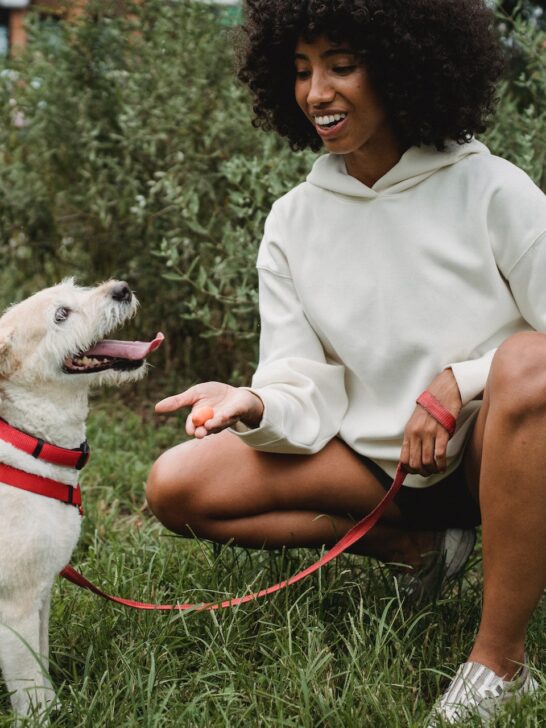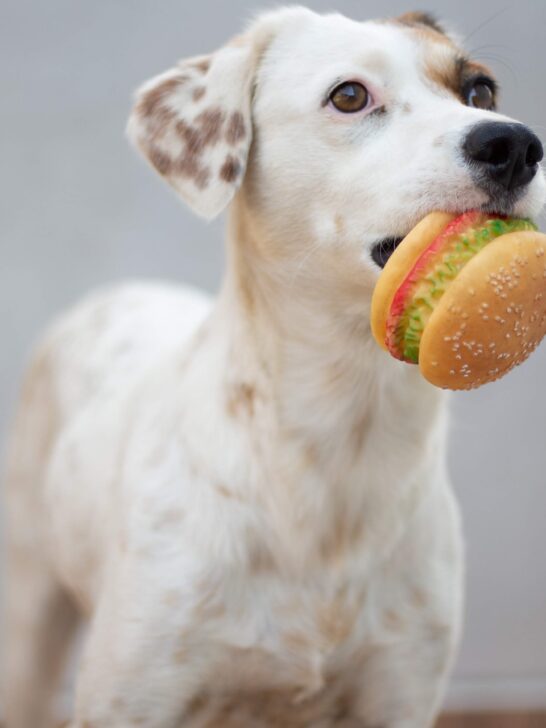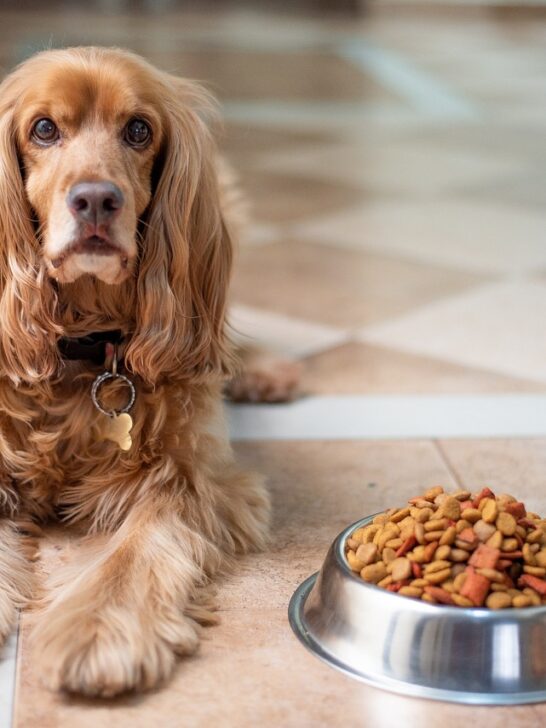What Do German Shepherds Eat? These 34 Things to Enrich Their Diet
German Shepherds are larger carnivorous dogs, but they can have a variety of items in their diets to help keep them interested.
They need a decent amount of healthy fat to keep them going, and it’s important that you know what they can eat. This way, you’ll keep your dog healthy and balanced throughout their lives.
But how do you know what your German Shepherd can eat?
We’re going to outline several things that should be a staple in their diets, and we’ll also give you several things you can periodically add to mix it up and make them excited for mealtimes.
German Shepherds need a balanced diet that contains a high level of protein to support strong growth and maintenance.
Fruits, vegetables, and some nuts are welcome treats that can spice up your dog’s diet and give them an extra boost of nutrients to fuel their higher energy levels and drive.

Feeding Requirements for the German Shepherd Breed
Every dog deserves to have a healthy and balanced diet that keeps them full between mealtimes.
However, the feeding requirements for German Shepherds will vary from dog to dog, and this can make it challenging to hit all of their nutritional needs.
There are a few considerations you want to keep in mind, and we outlined them below.
Size
The AKC Breed Standard claims that the German Shepherd breed stands 26 inches at the shoulder. Females can weigh between 49 and 71 pounds and males between 66 and 88 pounds.
These dogs have big appetites because they’re a high-energy breed, but you have to balance their size with their food portions to ensure they don’t gain too much weight.
Age
Your German Shepherd will need the appropriate nutrition levels at each developmental stage because it’ll change over time.
Puppies will need a higher calorie food with calcium and protein, and they’ll need more of it than your average senior dog. Make sure you’re giving them the appropriate food for their age and activity level.
Activity Level
This breed is very agile, muscular, and active as a working-class breed, and this means they need a high-quality diet to sustain them.
They should have a higher protein content and higher calories when they’re younger and active, and you adjust to lower calories and lower protein as they age and slow down.
Every dog food has a slightly different feeding recommendation. This YouTube video outlines a general guideline on feeding your dog as they go through the life stages.
They also give you feeding tips that ensure you’re giving your dog consistent portions every day. Generally speaking, you’ll feed your dog following the guidelines below.
- 10 to 30 Pounds – 1 ¼ to 2 ¼ cups per day
- 31 to 50 Pounds – 2 ¼ to 3 ½ cups per day
- 51 to 80 Pounds – 3 ½ to 4 ½ cups per day
- 81 to 100 Pounds – 4 ½ to 5 cups per day
- 101 Pounds and Up – 5 cups plus ½ cup for every additional 10 to 20 pounds
What is the Optimal Protein Content for German Shepherds?
This breed requires a diet that is very protein-rich with around 22% of the diet being dedicated to protein, according to the Association for American Feed Control Officials.
The slightly higher protein requirement is due to this breed being larger and more energetic or active.
Protein is vital for helping dogs keep up their energy levels as they play, and it can keep their coat and skin healthy.
A German Shepherd can eat almost any protein source, and any meat from a bird is safe to give them.
Birds give this dog the necessary fat, protein, and nutrients they need to support optimal growth.
Raw diets are very popular, and feeding this type of diet will help your dog get the vitamins and nutrients they need that would normally get cooked out.
If you cook your German Shepherd meat, you should boil or bake it before giving it to them.
According to the American Kennel Club, any bones you give your dog should be raw instead of cooked because this decreases the chances of them splintering and causing problems in your dog’s digestive tract.
Fish and other seafood are also safe to give your dog, and fish contains amino acids that are healthy for your dog’s skin and coat.
Salmon is an excellent choice, but you do want to ensure you get all of the small bones out before you feed it to them.
Don’t feed your dog raw fish because it can contain listeria or salmonella, and this can make them very sick.
Fish is very fatty and doesn’t have all of the vitamins your dog needs, so restrict feeding them fish to once or twice a week.
Organ meat like liver and gizzards or kidneys contain a host of vitamins and nutrients that are excellent for your dog. You do want to feed them small amounts to avoid causing loose stools.
Eggs are also safe, but you should be very careful if you choose to feed your German Shepherd raw egg whites because they can cause a biotin deficiency.

What Fruits are Safe for Your German Shepherd to Eat?
The fruit is a mixed bag as far as feeding goes because your German Shepherd doesn’t actually need it in their diets.
However, some fruit can be a welcome and low-calorie treat if you feed it to them in moderation.
Typically, fruits like pears, cherries, peaches, and apples are safe to eat as long as you remove any pits or seeds.
According to VetStream, eating the pits or seeds of these fruits can cause cyanide poisoning because they contain heavier doses of cyanogenic glycosides.
If you don’t handle this poisoning correctly, it can be fatal for your dog.
You can feed your dog avocados in small doses without a problem, but they do contain persin, and this is a fungicidal substance that can cause your dog to vomit or give them diarrhea.
Raisins and grapes are toxic to dogs, and they can cause everything from diarrhea to kidney problems or even kidney failure.
Melons and bananas are safe to give your dog an occasional treat as long as you don’t let them eat the rind or peel.
Different types of berries like blueberries are also safe in small amounts, and they come packed with healthy antioxidants and vitamins that can give your German Shepherd’s system a welcome boost.
PetMD says that it’s safe to feed oranges to your dog due to the higher vitamin C content, but they warn to be cautious as they also contain a big amount of citric acid.
They recommend feeding your dog a small amount and watching to see how they react before making it a regular addition to their diet.
Any fruit you give your dog should be done so sparingly. You can freeze a few fruits in water and give it to your dog as a sweet and cool treat during the hot summer months.
Just don’t add any excess sugar before you freeze it.
Is it Safe for German Shepherds to Have Nuts in Their Diet?
Nuts are another high-calorie food that should only be an occasional treat for your dog. Nuts will add protein to your dog’s diet, but they can cause weight gain if your dog eats a lot of them.
There are some nuts that are safe and some that aren’t, so you have to pay close attention before you feed your dog anything.
Since nuts are smaller, they present a unique choking hazard for most dogs. Luckily, German Shepherds are larger dogs, so they have a lower risk of choking.
You do want to monitor them either way when you give nuts to them, though to watch for any reactions.
Hazelnuts and peanuts are safe to feed to your dog, but you want to make sure that there isn’t any excess salt.
The nuts should be out of their shells, and not have any toppings or caramelization on them to make them as healthy as possible.
Pine nuts and almonds aren’t toxic to German Shepherds, but they can create problems when your dog’s body tries to break them down.
They can cause minimal stomach discomfort and diarrhea, and this risk goes up if the almonds or pine nuts have salt or another coating on them.
Pine nuts can also cause urinary tract problems, so Canidae recommends skipping both types.
Chestnuts and cashews are safe, but they have to be roasted before giving them to your dog.
Raw cashews and chestnuts have a toxin in them that is very similar to the toxin poison ivy has, and this can be dangerous if your dog ingests them.
Brazil nuts are also safe, but they have an extremely high-fat content.
If you feed your dog a lot of Brazil nuts over an extended period of time, they can trigger a pancreatitis attack.
It’s best to avoid feeding them Brazil Nuts altogether, but don’t panic if they accidentally get one or two.
Pecans, macadamia nuts, and pistachios are three big ones that you want to avoid giving to your German Shepherd at all costs.
Pistachios and pecans contain a substance called aflatoxin that can cause damage to your dog’s liver, and macadamia nuts release a toxin that is very harmful.
Even giving your dog one macadamia nut can cause them to experience fever, weakness, diarrhea, vomiting, and shivering.
Another nut that you want to avoid feeding to your dog is walnuts.
Nationwide Pet Insurance claims that walnut poisoning is one of the accidents they see most frequently, and poisoning from these nuts can cause a host of neurological complications or seizure activity.
Just like fruits and vegetables, but can be something you feed your German Shepherd in moderation.
You shouldn’t use them as the main treat and always double-check that they don’t have any excess salt or coatings on them.
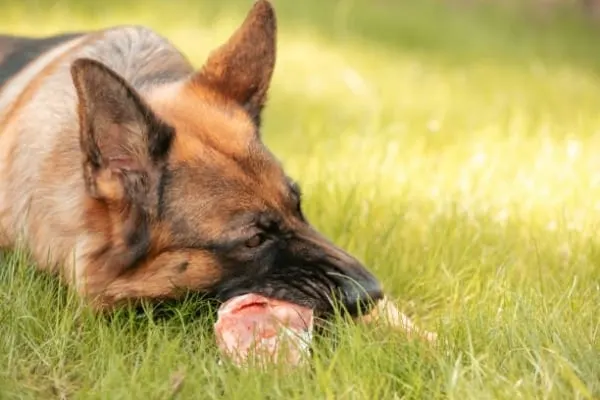
Can You Add Vegetables Into Your German Shepherd’s Diet?
Vegetables are slightly more clear cut as to which ones are and aren’t safe to add to your German Shepherd’s diet.
They don’t need a lot of vegetables in their diet, and moderation is a key component to feeding them any at all.
It’s a good idea to vary the vegetables you feed your dog because some have different vitamins and nutrients than others.
According to the Pet Poison Helpline, all members of the Allium family like leaks, chives, onions, and garlic are very dangerous for your dog to eat.
These vegetables have something called thiosulphate, and this can cause your dog to become anemic.
Anemia can cause your dog to feel weak, have vomiting or diarrhea, elevate their heart rate, and cause them to collapse.
Keep any and all onions away from places your dog can reach. They could be okay with a tiny amount of onion if they accidentally get into it, but it’s better to avoid them.
Also, avoid feeding your German Shepherd anything seasoned with onion or garlic.
Ripe and red tomatoes are generally considered safe for German Shepherds to eat, but they can’t eat the leaves, stems, or any green parts of the plant because it contains solanine.
Solanine can cause your dog to experience seizures, tremors, or problems with their heart. Always give your dog small amounts and monitor them after to ensure they don’t have a reaction to it.
Potatoes are another vegetable that falls into the same family as tomatoes, so you shouldn’t feed them to your dog raw.
The AKC recommends cooking the potatoes in water with no salt, butter, and oil before serving them to your dog. They have a lot of carbohydrates, and this can cause weight gain if they eat a lot of them.
Carrots are an excellent snack for your dog because they come packed with essential vitamins and nutrients while helping to improve your dog’s dental health.
The fiber can ensure your dog stays regular, and you can serve them raw, cooked, or dehydrated.
Cucumbers and celery have lots of minerals and vitamins that are good for your dog, and bell peppers are a crunchy treat that has a high antioxidant content.
The taste can be very strong, so see how your dog likes it before you offer them a decent amount. Pumpkin has a high fiber content that is good for dogs as well.
The vegetables we listed above are safe for your German Shepherd to eat in small amounts, but you shouldn’t try to replace the meat in their diets with vegetables.
They need a lot of protein to support their systems, and vegetables should act as an occasional low-calorie treat.
Miscellaneous Additives to Your German Shepherd’s Diet
There are several other items you can add to your German Shepherd’s diet. However, they should all be in moderation, and you should avoid anything your dog doesn’t appear to tolerate well after the first try.
Dairy products like yogurt, cheese, and milk will all depend on whether or not your dog is lactose intolerant.
If they are, they’ll have a lot of trouble digesting any dairy products. If they’re not, it’s safe to give dairy to your dog in small doses either by itself or mixed into their food.
If you want to give your dog something sweet without all of the sugar, try giving them a little bit of honey.
Trupanion points out that honey has several health benefits for dogs because it comes loaded with antioxidants and vitamins.
Pure honey is a better choice than artificial honey because it doesn’t contain any artificial sweeteners that could upset your dog’s stomach.
Peanut butter is a long-time favorite treat of many dogs, and many pet parents use it to hide medications.
Any peanut butter you feed your German Shepherd should be unsalted, natural, and raw because it will avoid the artificial sweeteners that can be dangerous if your dog eats them.
Popcorn offers no nutritional benefits for your dog, but it’s safe to feed it to them as long as it’s unsalted and unbuttered.
1800 PetMeds also recommends making sure that the popcorn pops all of the ways through to prevent choking. It does contain thiamine, riboflavin, and iron to help promote eye healthy and good digestion.
Bottom Line
There are dozens of things you can add to your German Shepherd’s diet to make them excited to eat, but you want to be careful and keep an eye on your dog with each new addition.
If you think your dog got into something they shouldn’t have, it’s a good idea to call the Pet Poison Helpline at 800-213-6680 or your local veterinarian.
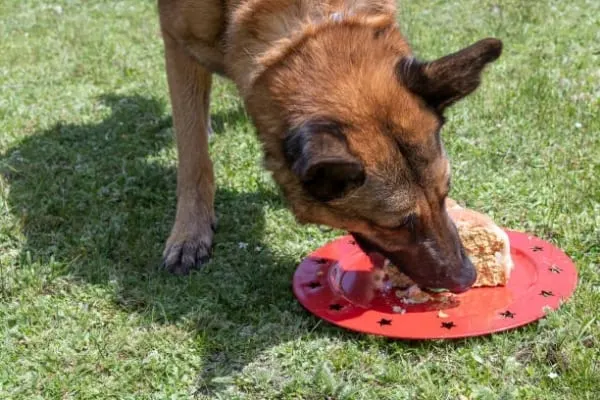
34 Things German Shepherds Can Eat
- Any protein source from a bird
- Raw bones
- Cooked seafood
- Cooked Fish
- Organ meat
- Eggs
- Pears
- Cherries
- Peaches
- Apples
- Avocados
- Melons
- Bananas
- Berries
- Oranges
- Hazelnuts
- Peanuts
- Pine nuts
- Almonds
- Cashews
- Chestnuts
- Brazil nuts
- Tomatoes
- Potatoes
- Carrots
- Cucumbers
- Celery
- Bell Peppers
- Cheese
- Yogurt
- Milk
- Honey
- Peanut Butter
- Popcorn
Related Reading: Why Do German Shepherds Eat Grass: the Logic Behind This Strange Habit

















